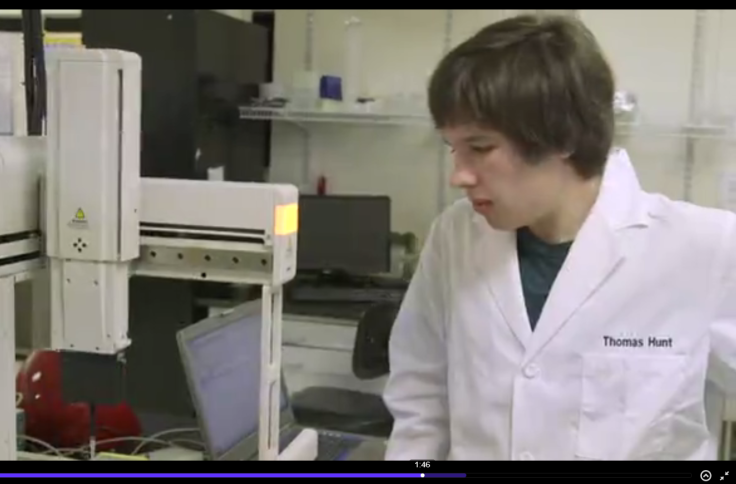Thomas Hunt, 17-Year-Old Scientist, May Be On His Way To Curing Cancer

Seventeen-year-old Thomas Hunt has always been a fan of big ideas. Throughout his early teens, his sharpened sense of direction and motivation have led him to become the youngest member on a cancer research team investigating new drugs to stop the disease.
“I’d like to see cancer in history books the same as how polio and smallpox are written in history books, Hunt told San Jose Mercury News.
Hunt began volunteering at SENS Research Foundation (SRF) when he was just 13. After persistently asking lab researchers to take him on, completing college courses on chemistry, and reading cutting-edge papers on cancer research, Hunt is now spearheading a project on telomere maintenance mechanisms, with the hope of stopping cancer before it can even start.
“I’ve always been fascinated by science,” Hunt says on SENS Research Foundation’s website. “Every year since kindergarten, I’ve entered the science fair with fun projects.” Hunt became interested in molecular biology at age 13 and decided to complete a project on corn-based food products for genetic modification with the help of BioCurious, a citizen scientist community. He was also assisted by SRF labs and researchers, which opened his eyes to the world of age-related diseases like cancer.
“Many people considered the diseases they worked on inherently incurable, or had given up trying to understand them,” Hunt said. “I have several relatives whom I’ve lost to supposed ‘natural causes.’ This really opened my eyes to what’s important and what I want to do with my life.” Hunt’s own grandfather is currently fighting cancer.
If Hunt can find a way to stop the telomeres of cancer cells from getting longer, he could prevent it from even starting. He works closely with biomedical gerontologist Aubrey de Grey, who is the founder of SRF and famous for his research into aging and claiming that humans will one day be able to live for hundreds of years.
Hunt dropped out of high school to pursue his research, which he works on four days a week at SRF in Mountain View, Calif., and is funded by the Thiel Foundation after he won a $100,000 award. In his spare time, he takes college-level courses at home on subjects that he chooses (such as online courses from the Khan Academy), reads new material on topics related to his research, and enjoys learning about the chemistry of cooking and baking.
If Hunt’s story isn’t already inspiring enough, he says that his ultimate goal is to leave the world a little better than how he found it.



























